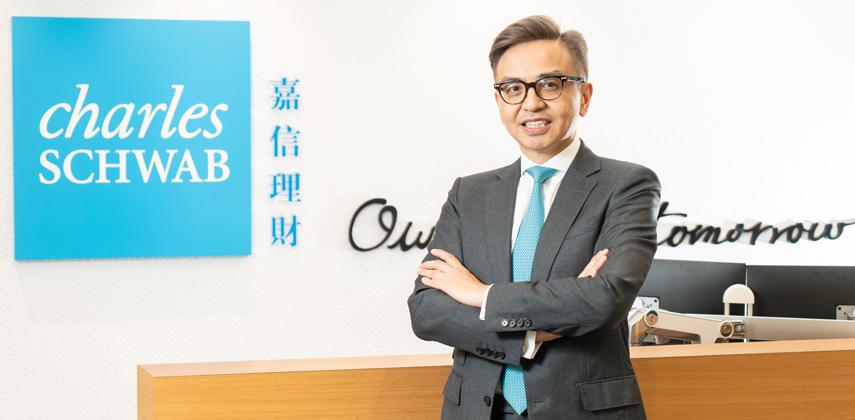A key objective for Michael Fong in his role as managing director of Charles Schwab Hong Kong is to take the emotion out of investing and promote a better understanding of market ups and downs.
“One of our principles is to make the process more efficient and effective,” he says. “For that, we first have to see things through the clients’ eyes to appreciate their needs, goals, timelines and risk tolerance, before offering advice on how best to create a diversified investment portfolio. But it also means doing more to educate clients about different asset classes and taking steps to raise the general level of financial literacy.”
To that end, the firm has launched a whole series of workshops, bringing in experts to talk about things like behavioural finance, managing risk, economic cycles and asset allocation.
Even for the portion of “self-directed” clients who manage their own portfolios using the firm’s trading platform, such sessions can provide invaluable insights. And for those who are newer to the world of online investing in US equities, fixed-income bonds and offshore mutual funds, it is a chance to understand not just the factors which influence market movements, but also how the combination of methodical research and well thought out strategies can help to achieve consistently better investment returns over the long term.
“We are providing services and solutions, not just products,” says Fong, who notes that individual clients the firm assists on an advisory basis must meet a minimum threshold of US$25,000 to open an account. “We focus on US dollar investing, offering opportunities to diversify in US markets. For all our clients, trust and pricing are important. We have an obligation to share information with them and explain what is happening in the market, and we always recommend creating a financial plan as the best way to start.”
Fong began his own journey in the finance sector half a world away from his current high-rise office in Central, in both literal and figurative senses. As a first generation Chinese-Canadian, who takes equal pride in both sides of his heritage, he was born in Winnipeg, Manitoba in the late 1960s and grew up there completely comfortable in two contrasting cultures.
His parents came originally from landowning families near Kaiping in Guangdong province and, in line with tradition, were brought together for an arranged marriage in their late teens. In search of better prospects, they moved to Hong Kong in the 1950s, but with a growing family and mouths to feed, Fong’s father then left for Canada to work in a relative’s restaurant business and send back every spare dollar.
Hard work and accumulated savings meant that, after eight years, Fong’s mother and elder siblings were finally able to migrate to Winnipeg, where they embarked on a new life in a new country.
“I come from a very traditional Chinese family,” Fong says. “We kept a lot of the old customs, and I grew up listening to my great-grandmother’s stories about Chinese values, which was very important for me. My earliest memories, though, are that it was cold and, as we only spoke Chinese at home, I had to start speaking English on entering nursery school.”
Generally speaking, he sailed through his school years, enjoying most of it, and bit by bit came to appreciate how Canada is a mosaic of cultures in which individuals can keep their identity.
Going on to the University of Manitoba made logical sense and, with no particular plan, Fong opted for the four-year BSc in actuarial sciences.
“I was still trying to figure out what to do and ended up choosing this,” he says. “It wasn’t a calculated move to become an actuary. Of course, I wanted to be successful, but for me that meant having a good job so I could provide for a family and take care of my parents as a matter of filial piety.”
Graduating in 1991 in a weak job market, he took an entry-level role with an insurance firm, but as things picked up he made the move to Toronto, the country’s financial capital. After applying for many jobs, he found work in a paging company’s call centre, mainly handling phone inquiries and activating services, and realised the importance of learning from every opportunity.
“For instance, l learned that you have to be patient with clients and you have to listen; they appreciate that.”
A year on, he joined the call centre of Toronto Dominion Bank and, with a new sense of direction, managed to engineer a move to their online brokerage services.
“That was the break into financial services,” he says. “Then, after a year and a bit, I applied for a role as a financial analyst in the group finance division and things really took off. I did analysis for projects across the organisation; one was on TD Bank’s Hong Kong branch.
Subsequently, when visiting Hong Kong on family business, he met the local managing director, was invited to transfer and, in 2000, began to run the call centre for the brokerage arm.
“It was a step forward because I always felt Asia was the place to improve myself and grow my career.”
In 2002, he went to Singapore to help integrate a joint venture and, later, run the credit function and middle office. And, over the following decade, diverse front- and back-office roles with CITIC Ka Wah Bank in Hong Kong, then online firm E-Trade and insurance firm Fidelity, paved the way to Charles Schwab.
“I saw I could do a lot here, working for a market leader in the wealth management space,” says Fong, whose forte is ideation and helping staff maximise their strengths.
“With three kids, my other focus is family, but I have also joined a start-up career mentoring charity and serve my church with Bible study classes and helping others to further their faith.”


